Key takeaways:
- Hospital ministry emphasizes the importance of being present, providing emotional support, and the holistic approach to patient care, integrating spiritual, physical, and emotional aspects.
- Ongoing development through training in communication and cultural competency is crucial for enhancing the effectiveness of hospital ministry and meeting diverse patient needs.
- Key challenges include managing emotional toll on caregivers, adapting to unpredictable situations, and understanding healthcare policies while advocating for patients.
- Personal growth in hospital ministry arises from interactions with patients, the importance of sharing experiences, and the need for reflection to improve emotional resilience and understanding.
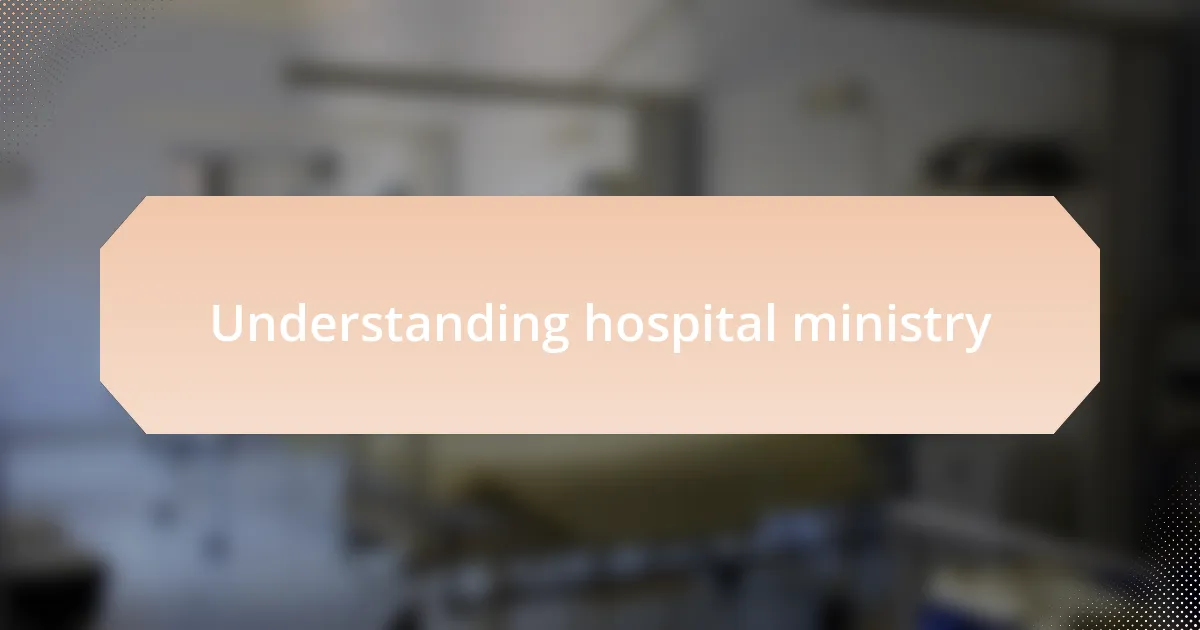
Understanding hospital ministry
Hospital ministry is a unique blend of spiritual care and compassionate support tailored for patients and their families during some of life’s most challenging moments. I remember a time when I visited a local hospital where I encountered a family grappling with the uncertainty of a loved one’s surgery. The depth of their anxiety was palpable, and it underscored for me how important a listening ear and a compassionate presence are in these settings.
One striking aspect of hospital ministry is the opportunity it provides for profound connections. I often found myself sharing a simple moment of prayer with someone who, despite their fear, found solace in knowing they weren’t alone. How often do we overlook the healing power of just being present with someone in distress? This thoughtful companionship can bridge loneliness and remind patients that hope and support exist even in the harshest circumstances.
Furthermore, I’ve learned that hospital ministry extends beyond individual encounters. It’s about creating a culture of caring within the healthcare system. Each day spent in this environment reinforces my belief that a holistic approach to healing—combining physical, emotional, and spiritual care—is essential. What role do you think spirituality plays in recovery? From my experience, it often becomes a source of strength, helping individuals regain a sense of control amidst vulnerability.
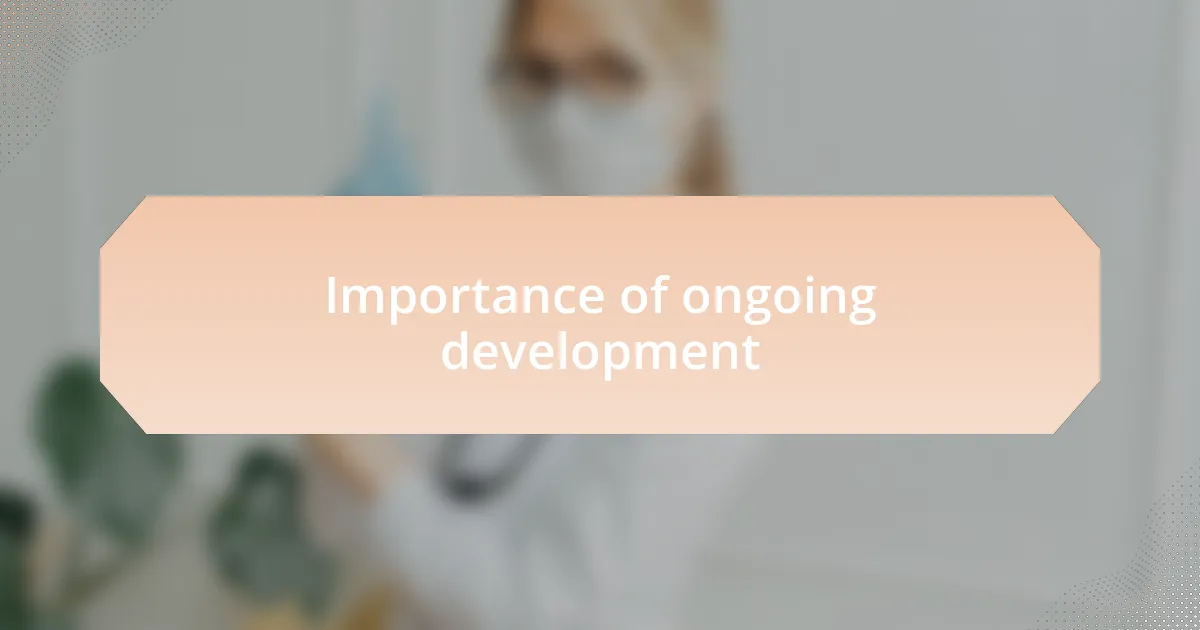
Importance of ongoing development
Ongoing development within hospital ministry is essential for ensuring that both caregivers and patients receive the best possible support. I recall a training session I attended focused on grief counseling techniques. It opened my eyes to the evolving needs of families facing loss and taught me that adapting our approach is vital; it’s not just about what we know, but how we continue to learn and grow in these emotionally charged environments.
Moreover, I believe that continuous education helps foster resilience among hospital chaplains and volunteers. I once joined a workshop that emphasized the integration of cultural sensitivity in spiritual care. Witnessing colleagues broaden their skill sets reminded me that being attuned to diverse backgrounds enhances our ministry’s effectiveness. How can we effectively serve our communities if we don’t actively educate ourselves about their unique challenges?
Lastly, engaging in ongoing development allows us to reflect on our practice and acknowledge areas for improvement. After facilitating a support group, I received feedback that prompted me to rethink my communication style. Seeing how a small adjustment led to deeper trust among group members reinforced my understanding of the significance of continual self-assessment in enriching our ministry’s impact. Are we not called to be better stewards of hope and peace?

Key skills for hospital ministry
A key skill in hospital ministry is effective communication. I’ve learned this firsthand during a particularly emotional visit with a patient who was struggling with a diagnosis. I realized that taking the time to listen actively, rather than simply offering platitudes, creates a genuine connection. How often do we overlook the power of our words and the silence that follows them?
Empathy is another vital trait I find indispensable. I once sat with a family in crisis after receiving difficult news. The raw emotions in the room were palpable, and I felt the weight of their grief. Being present and authentic in emotional moments not only fosters trust but also reassures those suffering that their feelings are valid. Isn’t it remarkable how just sharing silence can ease the burdens of others?
Cultural competence is increasingly important in our diverse society. I remember attending a multicultural seminar where we discussed various beliefs and practices affecting patient care. The stories shared opened my mind to the richness and complexity of individual experiences. I often ask myself: how can we offer meaningful support without understanding the cultural contexts of those we serve? Building this awareness has profoundly shaped my approach, reminding me that ministry is not one-size-fits-all.
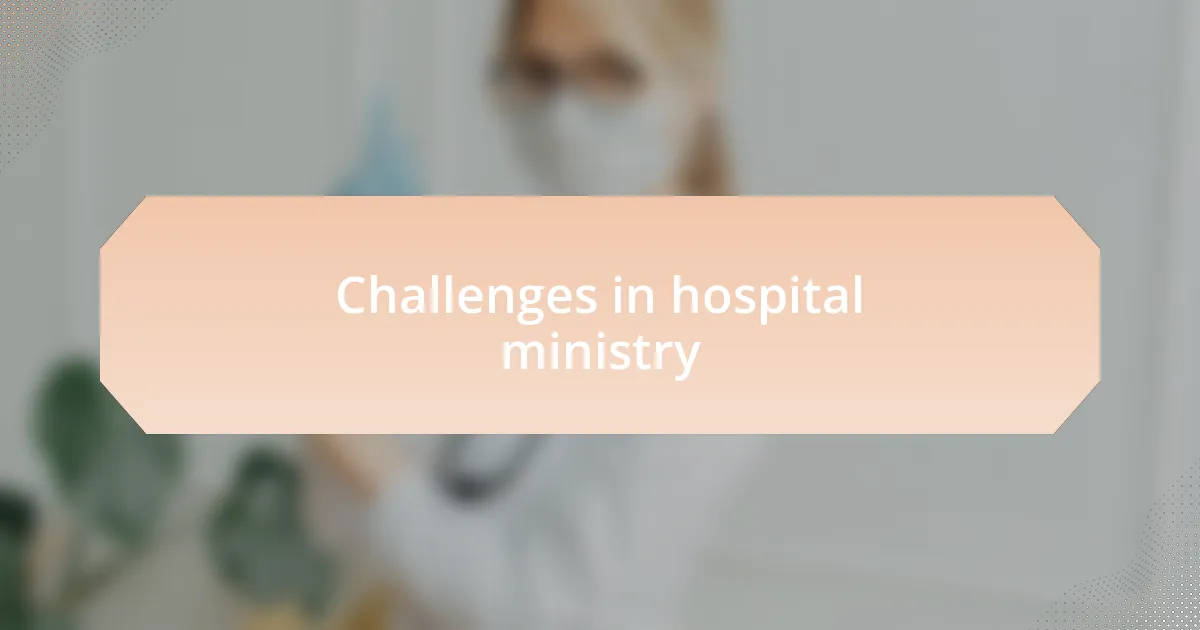
Challenges in hospital ministry
Hospital ministry comes with its share of challenges, and one of the most pressing, in my experience, is dealing with the emotional toll on caregivers. I remember the weariness I felt after a long week of visiting patients. Each story left a mark, each tear I wiped away added to my own burden. How do we navigate our emotional health while holding space for others? This balance can be a tricky tightrope to walk, reminding me that self-care is not just a suggestion, but an absolute necessity.
Another challenge is the unpredictability of patient needs and institutional dynamics. There was a day when I arrived, prepared for a sermon, only to find that the patients were far more interested in sharing their personal struggles with loss. I quickly learned to pivot my approach, embracing flexibility over rigidity. Shouldn’t we always be ready to meet people where they are? This adaptability has taught me that effective ministry often lies in the ability to respond to the immediate needs of the moment.
Lastly, navigating the complexities of healthcare policies can be daunting. Early in my ministry, I discovered that understanding the bureaucratic landscape is as crucial as offering spiritual support. I vividly recall a situation where a patient’s discharge was delayed due to paperwork, and I felt powerless. It made me wonder: how can spirituality thrive within a system often marked by red tape? Recognizing these bureaucratic hurdles has pushed me to advocate for my patients, blending pastoral care with a practical understanding of healthcare systems.
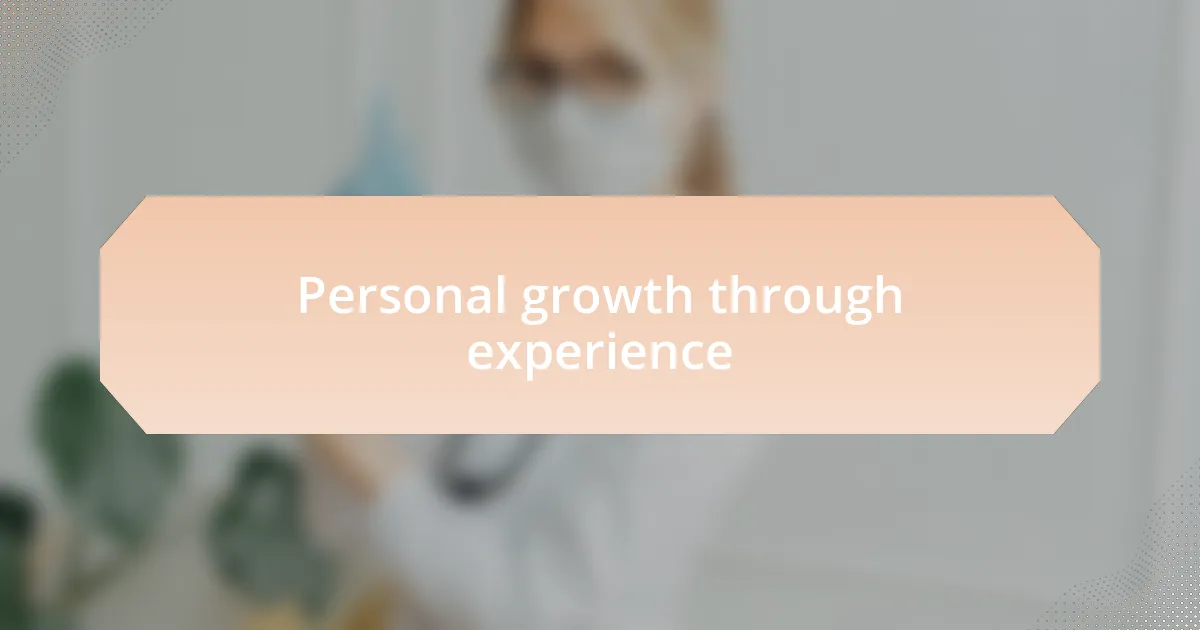
Personal growth through experience
Growth in hospital ministry often arises from the countless interactions with patients and families. One day, while listening to a mother share her fears about her child’s illness, I felt an overwhelming sense of empathy wash over me. In that moment, I realized how profoundly these experiences shape not just our ministry but ourselves, underscoring that personal growth often happens in response to the vulnerabilities we witness in others.
I also learned the importance of stepping outside my comfort zone. During a particularly challenging week, I was asked to lead a grief workshop unexpectedly. Initially, I hesitated—was I truly equipped to help others navigate their pain? However, as I shared my own story of loss, I felt a connection with the participants that enriched both their experience and my own. This taught me that sharing our journeys can illuminate paths for others while simultaneously paving the way for our growth.
Lastly, I’ve come to understand that personal reflection is crucial for development in this field. After a long day of hospital visits, I often find myself journaling about the experiences I encountered. This practice has not only helped me process my emotions but has also revealed patterns in my own responses to grief and joy. I think about how often we overlook the importance of reflection—how can we truly grow if we don’t take the time to understand our own emotional landscapes?
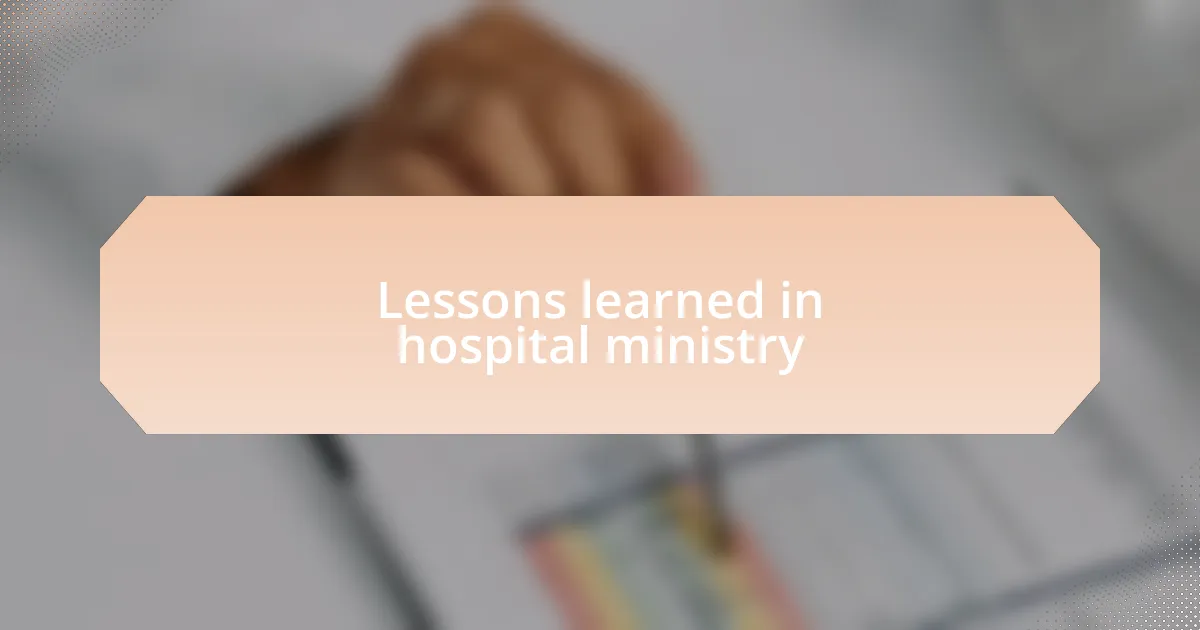
Lessons learned in hospital ministry
One significant lesson I’ve learned in hospital ministry is the power of active listening. I recall a moment when an elderly gentleman spoke about his health struggles, his voice shaky yet determined. As I sat quietly, giving him the space to share his story, I realized that often, people just need someone to truly hear them. This experience reinforced my belief that listening can be one of the most impactful forms of support we can offer.
I’ve also discovered that every encounter is an opportunity for growth, even in unexpected ways. I remember visiting a patient who was seemingly unresponsive. Initially, I felt disheartened, unsure of how to connect. But as I held her hand, I found comfort in simply being present. That taught me that sometimes, the best ministry isn’t about words; it’s about the silent understanding and presence we provide to those in need.
Navigating the emotional landscapes of hospital ministry has made me appreciate vulnerability in a new light. I faced my own tears during a farewell with a family whose loved one was nearing the end. Reflecting on that moment later, I understood that vulnerability isn’t a weakness; it’s a testament to our humanity. How often do we encounter situations that challenge our emotional reserves, yet emerge on the other side with deeper empathy? This lesson has shaped my approach, reminding me that it’s okay to show emotion—it connects us to those we serve.
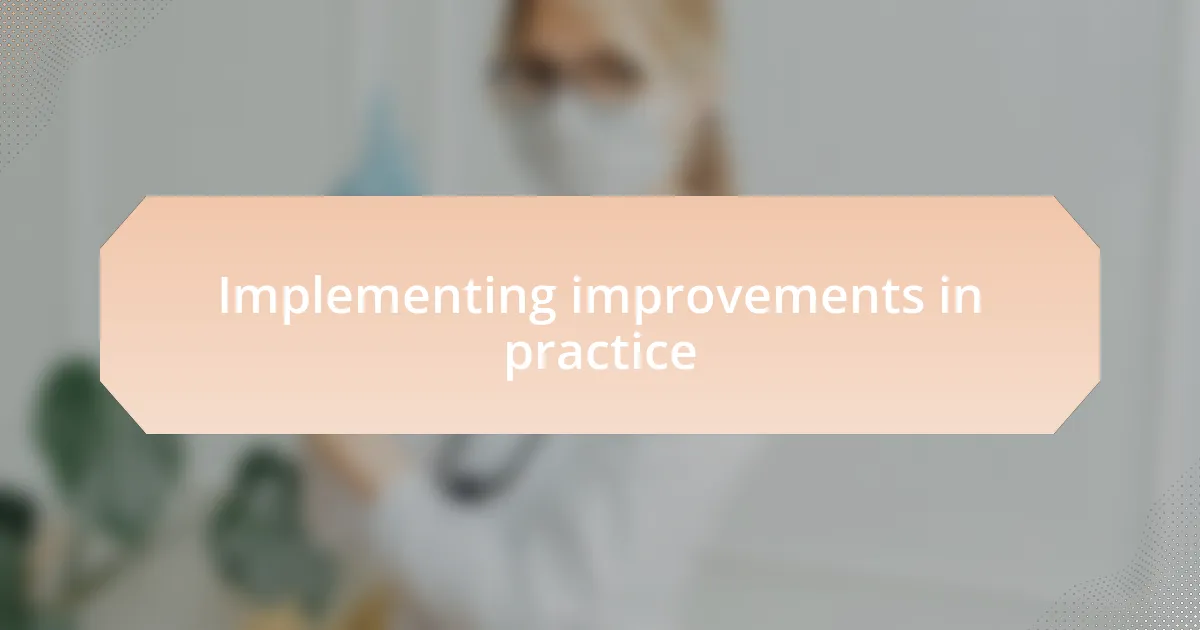
Implementing improvements in practice
Implementing improvements in practice requires a willingness to adapt and learn from each encounter. I vividly remember a time when we introduced a feedback system for our hospital ministry team. The responses were a mix of praise and constructive criticism. Engaging with this feedback helped us refine our approach, highlighting the importance of regular communication and adjustment in our methods.
Another lesson came when we decided to implement regular training sessions on empathetic communication skills. One poignant moment during a training was when a team member shared a painful experience that she had faced while comforting a grieving family. This vulnerability opened a deep discussion about how we can better support each other in our roles. It struck me that by improving our relational skills within our team, we naturally enhance our ability to connect with patients and families.
I’ve also realized that sometimes the smallest changes can lead to significant impacts. Simplifying our volunteer scheduling system made it easier for volunteers to participate. I noticed how this one adjustment brought a renewed energy to our team. How could such a small act shift our collective spirit? This experience reinforced my belief that thoughtful improvements, however minor they may seem, can create waves of positive change in our daily practice.